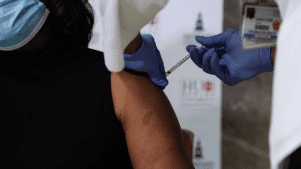BY JO WIEDERHORN, OPINION CONTRIBUTOR — 03/08/21 02:31 PM EST
THE VIEWS EXPRESSED BY CONTRIBUTORS ARE THEIR OWN AND NOT THE VIEW OF THE HILL
In the year since the start of the COVID-19 pandemic and the subsequent death of more than 500,000 Americans, researchers around the world have raced to develop vaccines at an unprecedented pace. But the quest to stop the pandemic in its tracks has collided with a long-standing problem: the lack of diversity in clinical trials. This issue must be addressed and the new federal administration can help.
The Centers for Disease Control and Prevention report that Black Americans are 1.1 times as likely as white Americans to contract COVID-19, 2.9 times as likely to end up in the hospital and nearly twice as likely to die from it. Yet the communities hardest hit by illnesses like COVID-19 are also those grossly underrepresented in clinical trials for cures and therapeutics.
In 2019, the Food & Drug Administration approved 11 new cancer drugs; only four percent of the participants enrolled in those clinical trials were Black. A disproportionate underrepresentation, since Black Americans account for 13.4 percent of the U.S. population and have the highest death rate for most cancers. This example is hardly unusual: over a 10-year period, less than five percent of participants in pivotal trials — late-stage studies used to win regulatory approval — were African American.
As for COVID-19 research, the pharma companies conducting the trials did make efforts to increase diversity but African American representation in trials was much lower than their proportion of patients with COVID-19. Diversity remains an issue the entire medical sector must address if we are to make progress.
The reasons certain groups are underrepresented are myriad. A shameful history of unethical medical practices like the Tuskegee study has led many Black Americans to distrust the medical community. That is compounded by present day racism and implicit bias in healthcare; for example, studies have shown that some doctors believe Black people feel less pain than their white counterparts.
Clinical trials may unintentionally exclude potential participants because they require travel to centers that are not easily accessible geographically, or may be only open during hours that would require participants to take time off work. Some sites may not be staffed with bilingual staff, interpreters, or have ethics board-approved non-English study materials. The lack of effort to address barriers to participation among people of color results in studies typically including very few Black and Latinx participants, whom research shows suffer from higher rates of chronic diseases and pre-existing conditions.
But work is being done to change that.
Mount Sinai’s Dr. Lynne Richardson, professor of Emergency Medicine and her colleague, Dr. Carol Horowitz, from the Institute for Health Equity Research at the Icahn School of Medicine at Mount Sinai have been advocating for a course correction in research, raising awareness among medical professionals and in underrepresented communities about the need for diversity in research and applying those very principles to their work.
Richardson was part of a community advisory board in New York’s Harlem neighborhood that regularly used input from African American community members, faith leaders and patients to guide their research on gene differences that increased the risk of kidney failure among people of African ancestry. The input gleaned helped researchers better understand the community, build trust, and successfully recruit and retain a large, diverse cohort.
At Columbia University, Lawrence S. Honig, director of the New York State-funded Center of Excellence for Alzheimer’s Disease and deputy director of the National Institutes of Health-funded Alzheimer’s Disease Research Center, is working to eliminate barriers to participation in both observational studies and clinical drug trials.
Honig attributes some successes in this area to robust efforts — including a multicultural staff with Spanish speaking coordinators and research assistants; creating study materials, including approved informed consent forms, in both Spanish and English; conducting regular educational and informational presentations in the community about disease, treatment and ongoing research; being flexible regarding scheduling appointments and providing adequate compensation and transportation fees for participants.
Methods used by Richardson and Honig are among those recommended to researchers by the FDA in “Enhancing the Diversity of Clinical Trial Populations — Eligibility Criteria, Enrollment Practices, and Trial Designs,” which provides guidance on how researchers can broaden eligibility criteria and increase enrollment of underrepresented populations in clinical trials.
Clinical trials and the people who volunteer to participate in them are essential to help develop safe and effective vaccines and cures. So what can the new Biden Administration do? They can push to ensure health agencies like the FDA and the NIH prioritize, promote and support diversity in clinical trials.
More diversity in clinical trials — more diversity across all of medicine — will serve to improve health equity and the health of our entire nation.
Jo Wiederhorn is president of Associated Medical Schools of New York, a nonprofit that represents New York’s 17 medical schools.

